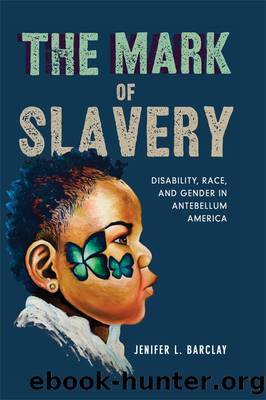The Mark of Slavery by Jenifer L. Barclay

Author:Jenifer L. Barclay [Barclay, Jenifer L.]
Language: eng
Format: epub
Tags: Social Science, General, Slavery, People With Disabilities, History, United States, Civil War Period (1850-1877)
ISBN: 9780252052613
Google: 7Q0iEAAAQBAJ
Publisher: University of Illinois Press
Published: 2021-04-13T02:49:54+00:00
âThe Secret of Masterâs Crueltyâ: Disability in Fugitive Slave Narratives
Fugitive slave narratives described harrowing journeys from slavery to freedom and were one of the most convincing strategies for promoting antislavery sentiments. These eyewitness accountsâwith white testimonials that verified their accuracy and authenticityâattested to the brutalities of enslavement. They drew powerfully on the principles of Christianity and democracy to affirm the humanity of enslaved people and denounce the hypocrisy of an American institution that denied them their inalienable right to freedom.69 In the antebellum years, many Americans recognized the power of these poignant firsthand accounts to garner sympathy and recruit individuals to the abolitionist cause, a quality that allowed later readers to dismiss the texts as suspect sources and abolitionist propaganda.70 Slave narratives explicitly detailed gruesome scenes of violence and exploitation, exposing the âprecariousness of empathy and uncertain line between witness and spectator.â71 At the time of their publication, however, these graphic depictions of black sufferingâfrom physical punishments to inner torment when sold away from family and friendsâdrew extensively on the language and imagery of disability to heighten readersâ indignation about the barbarity of slavery.
Images of disabled slaves and allusions to various disabilities were central to intensifying the heart-wrenching effects of fugitivesâ accounts. Some narratives even implored readers to extend their pity to the continued difficulties fugitives endured after they attained nominal freedom in the North. Slave narrativesâ references to disability and disabled people sometimes reaffirmed prevailing negative views (i.e., that brutal punishments reduced healthy, ânormalâ people to useless invalids or cripples). In other cases, they suggested an understanding of disability unique from those held by most whites. Stressing that disabled individuals were invaluable members of enslaved families and communities, slave narratives portrayed them not as liabilities but assets and their poor treatment at the hands of slaveholders as particularly egregious.72 Slave narratives also blurred the line between rhetoric and reality when authors recounted their own experience of permanent or temporary physical and psychological disabilities. These tracts were not merely sentimental rhetoric or extensions of medical and legal discourses that linked blackness to disability, though their white readership likely interpreted them through these filters.
Antebellum slave narratives employed disability rhetoric and imagery as a strategy to cultivate white sympathy and detail crucial experiences of enslaved life, which sometimes revealed understandings of disability unique to enslaved blacks. Disability rhetoric saturated fugitive slavesâ discussions of punishment, labor, separation and sale, family and community, and gender exploitation. Some narratives provided valuable insights into the lives of enslaved people with disabilities, based on firsthand experiences or as someone who witnessed their treatment. Usually, there was a distinction between the nondisabled fugitive narrator and the disabled slaves they described, a practice that invited the gaze of sympathetic whites engaged with the text. There are cases, however, in which allusions to the narratorâs own disabilityâor perceived disabilityâprevailed directly on readers to identify with the author. Harriet Jacobsâs Incidents in the Life of a Slave Girl and a lesser-known Autobiography of Henry Parker each employed this approach.
Given the inherent
Download
This site does not store any files on its server. We only index and link to content provided by other sites. Please contact the content providers to delete copyright contents if any and email us, we'll remove relevant links or contents immediately.
In Cold Blood by Truman Capote(3365)
The Innovators: How a Group of Hackers, Geniuses, and Geeks Created the Digital Revolution by Walter Isaacson(3108)
Steve Jobs by Walter Isaacson(2876)
All the President's Men by Carl Bernstein & Bob Woodward(2357)
Lonely Planet New York City by Lonely Planet(2204)
And the Band Played On by Randy Shilts(2179)
The Room Where It Happened by John Bolton;(2140)
The Poisoner's Handbook by Deborah Blum(2123)
The Innovators by Walter Isaacson(2088)
The Murder of Marilyn Monroe by Jay Margolis(2085)
Lincoln by David Herbert Donald(1976)
A Colony in a Nation by Chris Hayes(1912)
Being George Washington by Beck Glenn(1871)
Under the Banner of Heaven: A Story of Violent Faith by Jon Krakauer(1783)
Amelia Earhart by Doris L. Rich(1680)
The Unsettlers by Mark Sundeen(1674)
Dirt by Bill Buford(1660)
Birdmen by Lawrence Goldstone(1650)
Zeitoun by Dave Eggers(1630)
